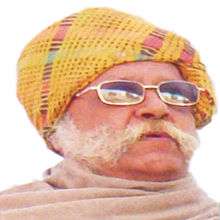Bhadri (estate)
.jpg)
Bhadri was an estate (taluqdari) of Oudh, British India. Now it is part of Pratapgarh district in Uttar Pradesh, India.
History
During the time of Oudh Government, Bhadri was scene of numerous of fights, the chief of which occurred in 1798 Fasli between Mirza Jan, the Nazim and the Taluqdar Rai Daljit Singh. The Nazim who had encamped in Bhadri, demanded a higher revenue from the Taluqdar, and in the dispute which followed taluqdar lost his life. After the battle of Manikpore (now as Manikpur in Pratapgarh district of Uttar Pradesh), in 1748, they made their peace with the Delhi authorities through the intervention of a Ddroga of artillery; and Jit Singh, the chief of Bhadri, attended a Darbar and obtained title of Rai. In 1798 the Nazim Mirza Jan visited Bhadri; he questioned the Rai Daljit Singh about his revenue, with a view to revision, and a quarrel ensued, in which the Rai Daljit Singh was killed. His son, Rai Zalim Singh, was thrown into prison in 1810 at Lucknow for non payment of the revenue and the property was taken under direct management.
While husband was in prison, His wife, Sheoraj Kunwar, visited Bhadri under pretext of performing some religious rites and there she assembled the clan and boldly collected the rents. She was besieged by the Chakladar, Jagat Kishor in the fort at Bhadri for eight days until orders came from Lucknow to stop attack and the courageous lady was permitted to occupy the castle. In 1815 the Rai was released and recovered the estate.[1]
Again in 1833 the Nazim Ehsan Husain, who is said to have had with him 50,000 men, besieged Rai Jagmohan Singh in Bhadri, on account of refusing to pay revenue. The Bhadri fort was unsuccessfully attacked for twelve days, when a compromise was effected. In the following year the Nazim continued his exactions, and extended them to the other Bisen Taluqdars, among them was Raja Hanumant Singh of Kalakankar-Dharupur. A fight ensured at the place and the Nazim was defeated with the loss of two guns. He again attacked the Bisens at Benti with a similar result; but nothing daunted. He assembles a larger force and besieged Bhadri for second time. There upon Rai Jagmohan Singh and his son Bishnath Singh fled across the border to British territory. At Ramchaura Ghat on the bank of Ganges, they were surprised and killed by the Nazim and slain was subsequently removed from office because of this great offence and violation of British territory. Taluqdars however remained loyal to British.
The fort of Bhadri was leveled in 1858 by order of government; its ruins are still to be seen, covered with picturesque clumps of bamboos.[2]
Bhadri was then given to Amarnath Singh, nephew and adopted son of Rai Jagmohan Singh, who was succeeded by his adopted son, Rai Jagat Bahadur Singh, whose father Sheoratan Singh, was killed at Allahabad in 1857. Rai Jagat Bahadur Singh also died without issue, and adopted Rai Sarabjit Singh, who received the hereditary title of Rai from the British government in November 1879. His property was taken under the management of the Court of Wards in 1867, on account of minority and indebtedness of the owner, and released in 1878. The Bhadri taluqa was well managed by Rai Sarabjit Singh, who left it practically unencumbered. Later estate was ruled by Rai Krishna Pratap Singh, who was succeeded by Raja Rai Bajrang Bahadur Singh around 1926/1930. After Independence of India on 15 August, 1947, the Bhadri (Taluq) state was merged in Republic of India. Raja Bajrang Bahadur Singh (1905-1970), the last ruler of Bhadri, served as Lieutenant Governor of Himachal Pradesh from 1 January, 1955 to 13 August, 1963. Rai Bahadur, Bajrang Bahadur Singh had no heir, after his death in 1970, his nephew Raja Uday Pratap Singh proceeded as incumbent titular of Bhadri.
List of taluqdars styled as Raja

- Rai Jit Singh fl.1748
- Rai Daljit Singh fl.1798
- Rai Zalim Singh, around 1810
- Rai Jagmohan Singh fl.1833
- Rai Jagat Bahadur Singh, d.1878
- Rai Sarabjit Singh, b.10 December, 1853- died before 1910
- Rai Krishna Pratap Singh, died around 1926/1930
- Raja Bajrang Bahadur Singh, b.1905, d.1970 (reign till 1947)
- Raja Uday Pratap Singh Bhadri
Notable descendants
- Raja Bajrang Bahadur Singh (1906-1973), was a Freedom fighter, 2nd Lieutenant Governor of Himachal Pradesh, Vice Chancellor of Govind Ballabh Pant Nagar University of Agriculture and Technology, founder of Hind Flying Club.
- Raja Uday Pratap Singh (1933), Hindu leader associated with RSS & VHP, Chief patron of Trilochan Pratap Singh Baugh Evam Paryavaran Sanrakshan Samiti.
- Raghuraj Pratap Singh alias Raja Bhaiya (1968), Incumbent MLA from Kunda, Cabinet Minister for several times.
- Akshay Pratap Singh alias Gopalji (1970), Member of 13th Indian Parliament, Member of Uttar Pradesh Legislative Council.
See also
References
- ↑ Roper Lethbridge (2005). The golden book of India (illustrated ed.). Aakar. p. 479. ISBN 978-81-87879-54-1.
- ↑ Roper Lethbridge (2005). The golden book of India (illustrated ed.). Aakar. p. 478. ISBN 978-81-87879-54-1.
